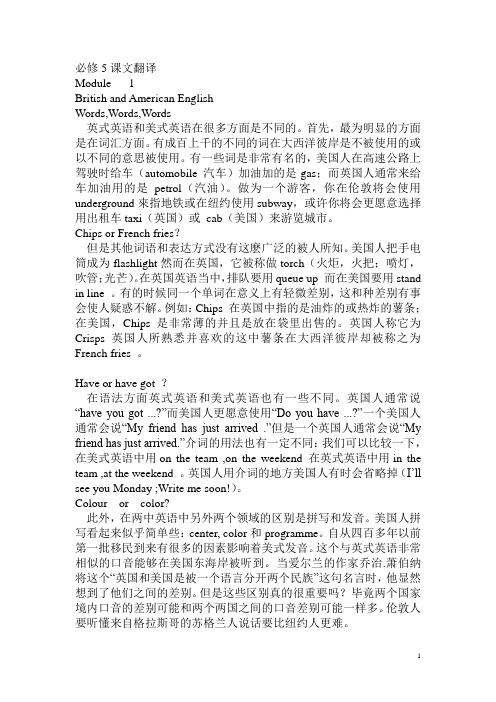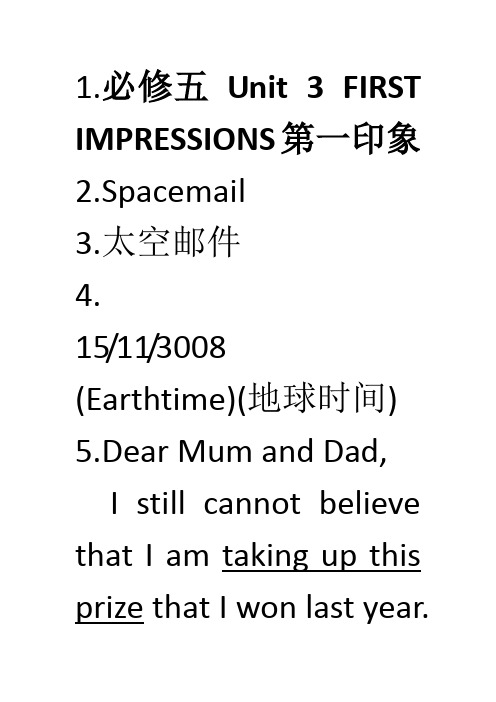必修5课文填空版+句子翻译
- 格式:doc
- 大小:80.00 KB
- 文档页数:12

必修5课文翻译Module 1British and American EnglishWords,Words,Words英式英语和美式英语在很多方面是不同的。
首先,最为明显的方面是在词汇方面。
有成百上千的不同的词在大西洋彼岸是不被使用的或以不同的意思被使用。
有一些词是非常有名的,美国人在高速公路上驾驶时给车(automobile 汽车)加油加的是gas;而英国人通常来给车加油用的是petrol(汽油)。
做为一个游客,你在伦敦将会使用underground來指地铁或在纽约使用subway,或许你将会更愿意选择用出租车taxi(英国)或cab(美国)来游览城市。
Chips or French fries?但是其他词语和表达方式没有这麽广泛的被人所知。
美国人把手电筒成为flashlight然而在英国,它被称做torch(火炬,火把;喷灯,吹管;光芒)。
在英国英语当中,排队要用queue up 而在美国要用stand in line 。
有的时候同一个单词在意义上有轻微差别,这和种差别有事会使人疑惑不解。
例如:Chips 在英国中指的是油炸的或热炸的薯条;在美国,Chips 是非常薄的并且是放在袋里出售的。
英国人称它为Crisps英国人所熟悉并喜欢的这中薯条在大西洋彼岸却被称之为French fries 。
Have or have got ?在语法方面英式英语和美式英语也有一些不同。
英国人通常说“have you got ...?”而美国人更愿意使用“Do you have ...?”一个美国人通常会说“My friend has just arrived .”但是一个英国人通常会说“My friend has just arrived.”介词的用法也有一定不同:我们可以比较一下,在美式英语中用on the team ,on the weekend 在英式英语中用in the team ,at the weekend 。

1.必修五Unit 1 JOHN SNOW DEFEATS “KING CHOLERA”约翰·斯诺击败“霍乱王”John Snow was a famous doctor in London - so expert, indeed, that he attended Queen Victoria as her personal physician.约翰·斯诺是伦敦一位著名的医生——他的确医术精湛,因而成为照料维多利亚女王的私人医生。
But he became inspired when he thought about helping ordinary people exposed to cholera.但他一想到要帮助那些得了霍乱的普通百姓时,他就感到很振奋。
This was the deadly disease of its day.霍乱在当时是最致命的疾病,Neither its cause nor its cure was understood.人们既不知道它的病源,也不了解它的治疗方法。
So many thousands of terrified people died every time there was an outbreak.每次霍乱暴发时,就有大批惊恐的老百姓死去。
John Snow wanted to face the challenge and solve this problem.约翰·斯诺想面对这个挑战,解决这个问题。
He knew that cholera would never be controlled until its cause was found.他知道,在找到病源之前,霍乱疫情是无法控制的。
He became interested in two theories that possibly explained how cholera killed people.斯诺对霍乱致人死地的两种推测都很感兴趣。

高中英语必修五课文及翻译集团档案编码:[YTTR-YTPT28-YTNTL98-UYTYNN08]-必修 5Unit 2 The United KingdomReadingPUZZLES IN GEOGRAPHYPeople may wonder why different words are used to describe these four countries: England, Wales, Scotland and Northern Ireland. You can clarify this question if you study British history.First there was England. Wales was linked to it in the thirteenth century. Now when people refer to England you find Wales included as well. Next England and Wales were joined to Scotland in the seventeenth century and the name was changed to "Great Britain". Happily this was accomplished without conflict when King James of Scotland became King of England and Wales as well. Finally the English government tried in the early twentieth century to form the United Kingdom by getting Ireland connected in the same peaceful way. However, the southern part of Ireland was unwilling and broke away to form its own government. So only Northern Ireland joined with England, Wales and Scotland to become the United Kingdom and this was shown to the world in a new flag called the Union Jack.To their credit the four countries do work together in some areas (eg, the currency and international relations), but they still have very different institutions. For example, Northern Ireland, England and Scotland have different educational and legal systems as well as different football teams for competitions like the World Cup!England is the largest of the four countries, and for convenience it isdivided roughly into three zones. The zone nearest France is called the South of England, the middle zone is called the Midlands and the one nearest to Scotlandis known as the North. You find most of the population settled in the south, but most of the industrial cities in the Midlands and the North of England. Although, nationwide, these cities are not as large as those in China, they have world-famous football teams and some of them even have two! It is a pity that the industrial cities built in the nineteenth century do not attract visitors. For historical architecture you have to go to older but smaller towns built by the Romans. There you will find out more about British history and culture.The greatest historical treasure of all is London with its museums, art collections, theatres, parks and buildings. It is the centre of nationalgovernment and its administration. It has the oldest port built by the Romans in the first century AD, the oldest building begun by the Anglo-Saxons in the 1060s and the oldest castle constructed by later Norman rulers in 1066. There has been four sets of invaders of England. The first invaders, the Romans, left their towns and roads. The second, the Anglo-Saxons, left their language and their government. The third, the Vikings, influenced the vocabulary and place-names of the North of England, and the fourth, the Normans, left castles and introduced new words for food.If you look around the British countryside you will find evidence of all these invaders. You must keep your eyes open if you are going to make your trip to the United Kingdom enjoyable and worthwhile.人们可能会奇怪为什么用不同的词语来描述英格兰、威尔士、苏格兰和北爱尔兰这四个国家。


1.必修五Unit 3 FIRST IMPRESSIONS第一印象2.Spacemail3.太空邮件4.15/11/3008 (Earthtime)(地球时间)5.Dear Mum and Dad,I still cannot believe that I am taking up this prize that I won last year.亲爱的爸爸妈妈:我现在仍然无法相信我是在接受去年获得的这个奖励。
I have to remind myself constantly that I am really in AD 3008.我得不断提醒自己,我真的已经进入到公元3008年了。
Worried about the journey, I wasunsettled for the first few days. As a result, I suffered from “Time lag”.因为担心这次旅行,头几天我心里总是不踏实,结果我得了时间滞后症。
This is similar to the “jet lag” you get from flying, but it seems you keep getting flashbacks fromyour previous time period.这就与你乘坐飞机会产生时差反应相似,所不同的是,在你的脑子里似乎会不断闪现以前的时光。
So I was very nervous and uncertain at first.因此,我一开始就感到神经过敏和心神不定。
However, my friend andguide, Wang Ping, was very understanding and gave me some green tablets which helped a lot.但是我的朋友兼导游王平很细心体贴,给了我几粒绿色药片,倒是挺起作用的。

1.必修五Unit1JOHNSNOWDEFEA”rinLondon-soexpert,indeed,th atheattendedQueenVictoriaas·斯诺是伦敦一位着名的医生——他的确医术精湛,因而成为照料维多利亚女王的私人医生。
Buthebecameinspiredwhenhet houghtabouthelpingordinarypThiswasthedeadlydiseaseofits day.霍乱在当时是最致命的疾病,Neitheritscausenoritscurewas understood.人们既不知道它的病源,也不了解它的治疗JohnSnowwantedtofacethecha llengeandsolvethisproblem.约翰·斯诺想面对这个挑战,解决这个问题。
Heknewthatcholerawouldnev erbecontrolleduntilitseoriesthatpossibly explainedho wcholerakilledpeople.斯诺对霍乱致人死地的两种推测都很感兴趣。
Thefirstsuggestedthatcholera multiplied intheair.AcloudofdaThesecondsuggestedthatpeopl e absorbed thisdisease into theirbodies withtheirmeals.第二种看法是人们在吃饭的时候把这种病毒引入体内的。
edthebodyandsoon t5.JohnSnowsuspectedthatthes econdtheorywascorrectbuthen eededevidence.斯诺推测第二种说法是正确的,但他需要证据。
SowhenanotheroutbreakhitLo年Asthediseasespreadquicklythr oughpoorneighbourhoods,heb egantogatherinformation.当霍乱在贫民区迅速蔓延的时候,约翰·斯诺就开始收集资料。
英语必修5课文翻译2篇【课文翻译1】课文一:《The Great Barrier Reef》澳大利亚的大堡礁是世界上最大的珊瑚礁系统,也是世界七大自然奇迹之一。
它横跨约344,400平方公里的面积,位于澳大利亚东北部的海域,是一个由上百个珊瑚岛和珊瑚礁组成的海洋生态系统。
大堡礁面临着许多环境威胁,尤其是全球变暖和海洋酸化对珊瑚的胁迫。
全球变暖导致海洋温度升高,珊瑚容易发生珊瑚白化,这是由于珊瑚体内共生的微生物受损而导致的。
海洋酸化则使珊瑚的骨骼变脆,难以生存。
此外,过度捕捞、海洋污染和旅游活动等也对大堡礁的生态环境造成了威胁。
为了保护大堡礁,澳大利亚政府采取了多项措施。
首先,他们实施了严格的法规和管理制度,限制了捕鱼和捕捞活动。
其次,他们设立了保护区,限制了旅游活动的规模和频率,以减少对珊瑚的冲击。
另外,政府还投资大量资金用于研究和科学监测工作,以便更好地了解和应对大堡礁面临的挑战。
大堡礁是一个宝贵的自然资源,不仅对澳大利亚来说具有巨大的经济价值,也对世界上其他地区的生态平衡和生物多样性至关重要。
我们每个人都应该意识到保护大堡礁的重要性,并采取行动,减少对其环境的破坏。
【课文翻译2】课文二:《The Water of Life》《生命之水》这篇课文讲述了水在我们生活中的重要性。
水是人类生命中最必需的资源,没有水就无法生存。
它既是人体的重要组成部分,也是支撑生态系统和农业生产的基础。
然而,正如课文中所提到的,全球范围内正在出现水资源短缺的问题。
水资源短缺的原因多种多样。
首先,人口的持续增长导致了对水的需求增加。
许多发展中国家面临着人口快速增长和供水设施不足的困境。
其次,气候变化也使得水资源变得更加紧缺。
干旱、洪水和极端天气事件的增多对水资源供应链造成了很大的压力。
此外,水的污染也导致可用水资源减少。
为了解决水资源短缺的问题,我们需要采取一系列措施。
首先是节约用水。
每个人都可以从小事做起,比如关掉水龙头、修复漏水管道等。
1.必修五Unit 1 JOHN SNOW DEFEATS “KING CHOLERA”约翰·斯诺击败“霍乱王”John Snow was a famous doctor in London - so expert, indeed, that he attended Queen Victoria as her personal physician.约翰·斯诺是伦敦一位著名的医生——他的确医术精湛,因而成为照料维多利亚女王的私人医生。
But he became inspired when he thought about helping ordinary people exposed to cholera.但他一想到要帮助那些得了霍乱的普通百姓时,他就感到很振奋。
This was the deadly disease of its day.霍乱在当时是最致命的疾病,Neither itscause nor its cure was understood.人们既不知道它的病源,也不了解它的治疗方法。
So many thousands of terrified people died every time there was an outbreak.每次霍乱暴发时,就有大批惊恐的老百姓死去。
John Snow wanted to face the challenge and solve this problem.约翰·斯诺想面对这个挑战,解决这个问题。
He knew that cholera would never be controlled until its cause was found.他知道,在找到病源之前,霍乱疫情是无法控制的。
He became interested in two theories that possibly explained how cholera killed people.斯诺对霍乱致人死地的两种推测都很感兴趣。
必修五重点句子翻译(总3页) -CAL-FENGHAI.-(YICAI)-Company One1-CAL-本页仅作为文档封面,使用请直接删除高二必修五重点句子翻译《陈情表》1、祖母刘愍臣孤弱,躬亲抚养。
祖母刘氏可怜我孤单弱小,亲自抚养。
2、既无伯叔,终鲜兄弟;门衰祚薄,晚有儿息。
既没有叔叔伯伯,也没有哥哥弟弟;门庭衰微福分又浅,很晚才得到儿子。
3、臣欲奉召奔驰,则刘病日笃;欲苟顺私情,则告诉不许。
我想手捧召书马上赶路,只因刘氏的病日重一日,想姑且迁就私情,但是报告申诉又得不到准许。
4、但以刘日薄西山,气息奄奄,人命危浅,朝不虑夕。
只因为祖母刘氏已像接近西山的落日,只剩一缕将断的气息,生命十分危险,已经处于朝不保夕的境地。
5、愿陛下矜愍愚诚,听臣微志,庶刘侥幸,保卒余年。
祈望陛下能体恤我愚拙至诚之心,满足我微不足道的心愿,或许祖母刘氏能因此侥幸,最终得以安度余年。
6、臣不胜犬马怖惧之情,谨拜表以闻。
我怀着像犬马一样不胜恐惧的心情,谨此上表禀告。
7、外无期功强近之亲,内无应门五尺之僮,茕茕独立,形影相吊。
在外面没有什么比较亲近的亲戚,家里没有照管门户的僮仆。
生活孤单没有依靠,只有自己的身体和影子相互安慰。
8、但以刘日薄西山,气息奄奄,人命危浅,朝不虑夕。
臣无祖母,无以至今日;祖母无臣,无以终余年。
只因为祖母刘氏已经像接近西山的落日,只剩一缕将断的气息,生命十分危险,已经处于朝不保夕的境地。
如果我没有祖母,就无法活到今天,如果祖母没有我的照顾,也就无法安度余年。
9、且臣少侍伪朝,历职郎署,本图宦达,不矜名节。
况且我年轻时曾在伪朝做官,历任郎官衙之职,本来就希望仕途显达,并不顾惜名声节操。
10、臣之辛苦,非独蜀之人士及二州牧伯所见明知,皇天后土,实所共鉴。
我的辛酸苦楚,不仅蜀地的人和二州的长官所目睹明知,连天地神明,也都能看见。
11、臣少多疾病,九岁不行,零丁孤苦,至于成立。
我小时候经常生病,九岁还不会走路,孤苦无依,直到长大成人自立门户。
必修5 Unit 1 Great scientists Reading JOHH SHOW DEFEATS “KING CHOLERA” John Snow was ______ famous doctor in London - so expert, indeed, _____ he attended Queen Victoria as her personal physician. But he became _________ (inspire) when he thought about helping ordinary people ______ (expose) to cholera. This was the ______ (dead) disease of its day. Neither its cause ______ its cure was understood. So many thousands of terrified people died every time there was _____ outbreak. John Snow wanted to face the challenge and solve this problem. He knew that cholera would never _______ (control) until its cause was found. He became interested ______ two theories that possibly explained _____ cholera killed people. The first suggested that cholera multiplied in the air. A cloud of dangerous gas floated around ______ it found its victims. The second suggested that people ________ (absorb) this disease into their bodies with their meals. From the stomach the disease quickly attacked the body and soon the ________ (affect) person died. John Snow suspected that the second theory was correct ______ he needed evidence. So when _______ outbreak hit London in 1854, he was ready to begin his enquiry. ______ the disease spread quickly through poor neighbourhoods, he began to gather information. In two particular streets, the cholera outbreak was _____ severe that more than 500 people died in ten days. He was determined to find out _______. First he marked on a map the exact places _______ all the dead people had lived. This gave ______ a valuable clue about the cause of the disease. Many of the deaths were near the water pump in Broad Street (especially numbers 16, 37, 38 and 40). He also noticed that some houses (such as 20 and 21 Broad Street and 8 and 9 Cambridge Street) had had no deaths. He had not foreseen this, so he made _______ (far) investigations. He discovered that these people worked in the pub _____ 7 Cambridge Street. They had been given free beer and so had not drunk the water from the pump. It seemed that the water was _________ (blame). Next, John Snow looked _______ the source of the water for these two streets. He found that ______ came from the river polluted by the dirty water from London. He immediately told the ________ (astonish) people in Broad Street to remove the handle _______ the pump so that it could not be used. Soon afterwards the disease slowed down. He had shown that cholera was spread by germs and not in a cloud of gas. In another part of London, he found _______ (support) evidence from two other deaths that were linked ____ the Broad Street outbreak. A woman, ______ had moved away from Broad Street, liked the water from the pump so much that she had it _______ (deliver) to her house every day. Both she and her daughter died ____ cholera after drinking the water. With this extra evidence John Snow was able to announce with certainty that polluted water _______ (carry) the virus. To prevent this from ______ (happen) again, John Snow suggested that the source of all the water supplies ________ (examine). The water companies were instructed not to expose people _____ polluted water any more. Finally "King Cholera" _______ (defeat). Using Language COPERNICUS’ REVOLUTIONRRY THEORY Nicolaus Copernicus was ________ (frighten) and his mind was confused. ________ he had tried to ignore them, all his mathematical calculations led to the same conclusion: _____ the earth was not the centre of the solar system. Only ______ you put the sun there did the movements of the other planets in the sky make sense. Yet he could not tell anyone about ______ theory as the powerful Christian Church would have punished him _____ even suggesting such an idea. They believed God had made the world and _____ that reason the earth was special and must be the centre of the solar system. The problem _______ (arise) because astronomers had noticed that some planets in the sky seemed to stop, move backward and _______ go forward in a loop. _______ appeared brighter at times and less bright at others. This was very strange _____ the earth was the centre of the solar system and all planets went round ______. Copernicus had thought long and hard about these problems and tried to find ____ answer. He __________ (collect) observations of the stars and used all his mathematical knowledge to explain _____. But only his new theory could do that. So between 1510 and 1514 he worked on it, gradually ________ (improve) his theory until he felt ______ was complete. In 1514 he showed it _________ (private) to his friends. The changes he made to the old theory were revolutionary. He placed _____ fixed sun at the centre of the solar system with the planets going round it and only the moon still _______ (go) round the earth. He also suggested that the earth was spinning as it went round the sun and this explained changes in the movement of the planets and in the brightness of the stars. His friends were enthusiastic and encouraged him to publish his ideas, but Copernicus was cautious. He did not want to _______ (attack) by the Christian Church, so he only published it ______ he lay dying in 1543. Certainly he was right to be careful. The Christian Church rejected his theory, _______ (say) it was against God's idea and people who supported ______ would be attacked. Yet Copernicus' theory is now the basis on _____ all our ideas of the universe are built. His theory replaced the Christian idea of gravity, _______ said things fell to earth because God created the earth as the centre of the universe. Copernicus showed this was _______ (obvious) wrong. Now people can see that there is a direct link ________ his theory and the work of Isaac Newton, Albert Einstein and Stephen Hawking.